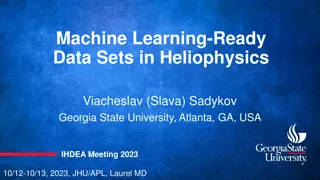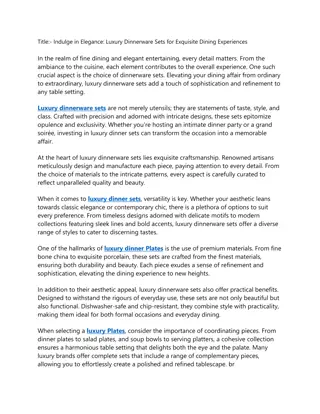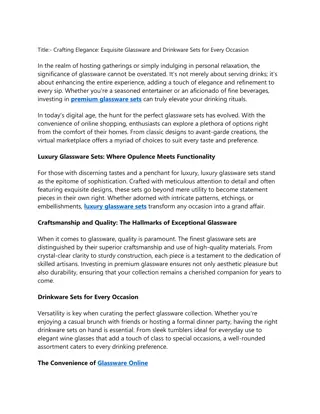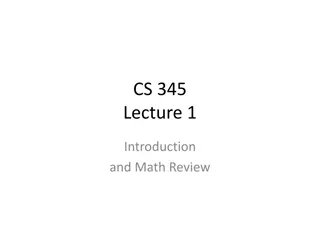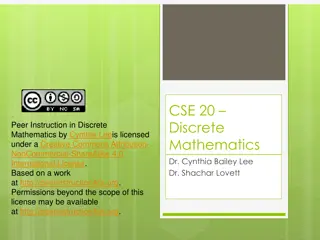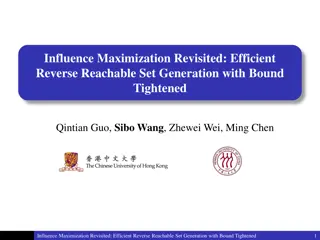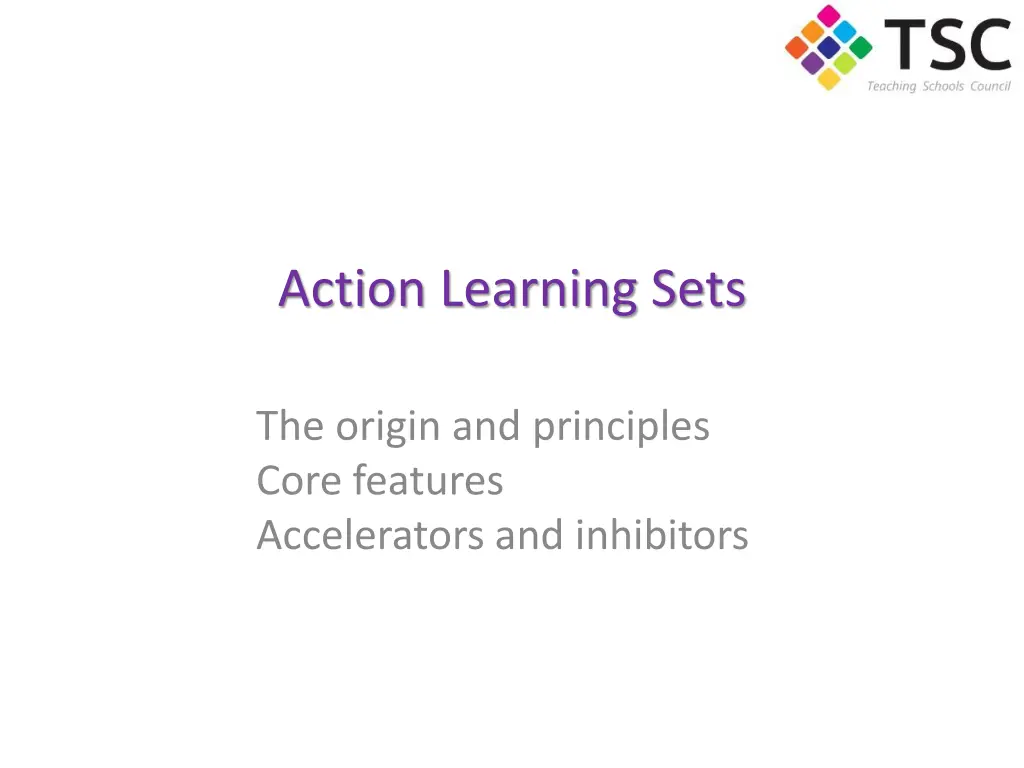
Principles and Origins of Action Learning Sets
Discover the origins of Action Learning Sets (ALS) and the core principles behind this powerful learning methodology. Learn how skilled questioning, group work, and active listening drive action and learning in ALS, fostering problem-solving and growth. Explore the key accelerators and inhibitors that shape the effectiveness of ALS, rooted in a rich history of learning and wisdom.
Download Presentation

Please find below an Image/Link to download the presentation.
The content on the website is provided AS IS for your information and personal use only. It may not be sold, licensed, or shared on other websites without obtaining consent from the author. If you encounter any issues during the download, it is possible that the publisher has removed the file from their server.
You are allowed to download the files provided on this website for personal or commercial use, subject to the condition that they are used lawfully. All files are the property of their respective owners.
The content on the website is provided AS IS for your information and personal use only. It may not be sold, licensed, or shared on other websites without obtaining consent from the author.
E N D
Presentation Transcript
Action Learning Sets The origin and principles Core features Accelerators and inhibitors
The origins of action learning sets (ALS) Reg Revans Started as physicist and an Olympic athlete. Inspiration for ALS from the sinking of the Titanic & Interviews his father (a marine surveyor) held with surviving crew When he later asked his father what he had learned his father replied to know the difference between cleverness and wisdom
The origins of ALS 2 Also as a research scientist, Revans was at Cambridge University, Revans was impressed by Ernest Rutherford s insistence that However eminent scientists were in their field, they had to be willing to share their doubts with each other. What does your ignorance look like to you? Revans remembered Rutherford asking at one of the regular meetings.
The origins and focus of ALS In 1945, the theory of action learning was born. Revans Formula is L = P + Q - (Learning = programmed knowledge + questioning insight) Revans Law: for an organisation to survive, its rate of learning must be at least equal to the rate of change in its external environment And learning must lead to action a key focus is ENSURING ACTION IS TAKEN BY MEMBERS So the aim is action shaped by learning and following all set meetings and members learn from and reflect upon that action.
Headline principles of ALS Following a structure Using skilled and insightful questioning Working as a group Equality of membership Working on real issues/problems Using active listening
Core principles FOLLOWING A STRUCTURE - ensuring all the following essential elements are used is core to the set s activity. USING SKILLED AND INSIGHTFUL QUESTIONING Set members help each other work on problems (rather than giving advice or suggestions). They use questions to help set members explore, understand and find solutions to, complex problems help set members generate their own insights, not at fixing the problem for them provide a balance of support and challenge questions will normally be open .
Ground rules- ALS involves WORKING AS A GROUP Normally of between 5 8 members which meets on an agreed basis over an agreed period of time sets agreed ground rules for its operation starts with a facilitator whose job is to make him or herself redundant over time EQUALITY OF MEMBERSHIP Set members contribute to their own and each others learning as problem holders, listeners and questioners: learning from their own and others actions sharing their experiences, mistakes and ideas openly providing support for all members of the group
Ground rules- ALS involves WORKINGON REAL ISSUES/PROBLEMS Members present authentic problems/issues/challenges that are real, current and actionable Reciprocal vulnerability is key USING ACTIVE LISTENING Effectively supporting, challenging and coaching set members through their attentive presence ALLOWING FOR REFLECTION AND FEEDBACK Members reflect on their experience and learning and are also given opportunities to reflect on the process Members provide feedback to each other on roles (problem holder, facilitator and set member) and process.
Questioning - Practical implications Skilled and insightful questions - focussed on helping the presenter solve their own problems means... What do we know/do already that will help us do this well? What experiences/aptitudes might get in the way? Will all open questions help? Might some closed ones help?
Working as a group practical implications What are the probable springboards to building effective ALS groups within this programme? What are the probable inhibitors to making group mechanics work? How and when should/can facilitators: Mitigate these? Address these?
Ensuring equality of membership Can we identify groups have we been in with genuine equality for all members? What helped secure this? Can we identify groups we have been in that should have done this and didn t do they help us identify what we should try to avoid?
Working on real problems means What will help participants ensure the problems they choose are real and properly challenging? What might get in the way?
Specific ALS protocols for this programme Each ALS will have 4 members and a facilitator Each member of the group has 10 minutes to explore their issue of choice. Others ask questions to help problem holders see their issue from a broader perspective if needed! Questioning must be for the benefit of the problem holder only After the 10 minutes of questioning, the problem holder will have a 5 minutes debrief e.g. to analyse the questioning and thinking that helped them reframe and move to action This will assist in developing the ALS style for future sessions
Action Learning Set Split into two groups now You will now have the opportunity to take part in an Action Learning Set to help tackle any issue that you are currently facing within your role. The ALS will last for 60 minutes with each member receiving an equal allocation of time and this will all be lead by your Action Learning Set facilitator.

